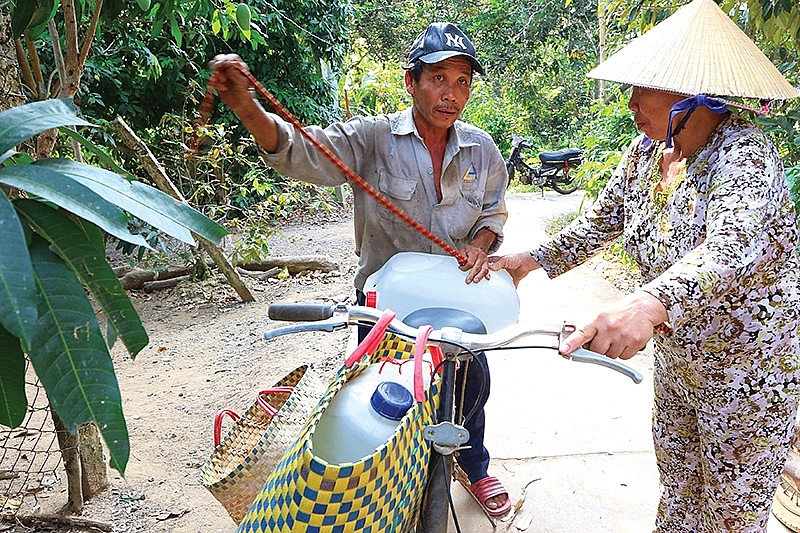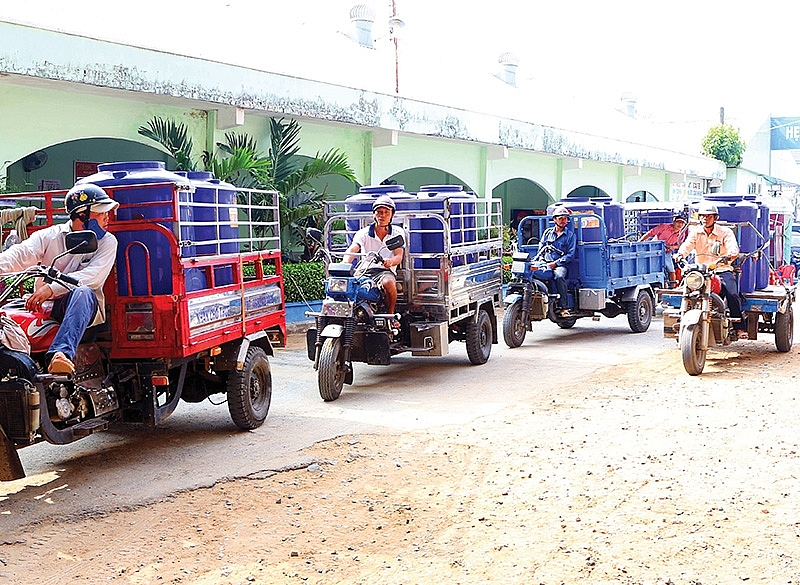Mekong farmers’ livelihoods in peril
 |
| Water shortages are rampant, with 95,000 families left without fresh water |
In Tien Giang province, durian farmers are feeling the impact of an unprecedented environmental crisis. One farmer’s garden covers an area of 6,000 square metres with 160 durian trees and a productivity of six tonnes per year, which generates more than VND300 million ($13,000) per year. However, the saline water in Mekong Delta caused him another ruined crop of durians. The water-storage system in the garden is completely empty. He intended to hire water barges to deliver fresh water to the garden, but he soon abandoned this plan because there is not enough fresh water to save the durian trees.
Another durian grower said that 50 trees in his garden are dying due to saline intrusion. Before the spring holiday, he harvested a batch of durians and sold them to traders for over VND60,000 ($2.60) per kg. After the COVID-19 outbreak, durians cannot be exported to China, so traders are only paying VND20,000 ($0.85) per kg, a third of the initial price. He has to accept much lower prices because his durian trees are quite weak due to lack of water.
 |
| Residents in the Mekong Delta wait for free fresh water transported from Ho Chi Minh City for their daily activities and production. Photo: Le Toan |
Similarly, durians and catfish in Ben Tre province have also suffered from saltwater encroachment. A durian grower in Tien Long town said that he lost 70 per cent of his durian growing area as a result of water scarcity.
After the Lunar New Year holiday, the natural channels around the garden dried up, while salinity levels surpassed the tolerance level of durian trees. Catfish farming areas have also been hit by saline intrusion. GoDaco Seafood Company said that each farming area has around 400 dead catfish per day, with the figure sometimes reaching 600.
In 2016, drought and saline intrusion in the Mekong Delta was the most severe the region had experienced in a century. However, all previous records have been broken during this year’s dry season. Five Mekong Delta provinces – Ben Tre, Tien Giang, Long An, Ca Mau, and Kien Giang – have declared a state of emergency, and last week Prime Minister Nguyen Xuan Phuc approved a support fund worth VND70 billion ($3 million) for each province to deal with the disaster.
According to a report by the Ministry of Agriculture and Rural Development, saline intrusion has severely affected production and livelihood in the region since last December. The situation is getting worse, impacting 10 out 13 provinces in the Mekong Delta, only excluding An Giang, Dong Thap, and Can Tho.
Around 40,000 hectares of rice paddies have been damaged due to drought or salinity across the five most heavily-affected provinces. Water shortages are also rampant, with 95,000 families left without fresh water. Among them, Ben Tre has suffered the most since mid-January, and was the first province in the Mekong Delta to announce a state of emergency.
PM Phuc praised the ministries, sectors, and seven coastal provinces for the way they have taken a proactive approach and implemented innovative solutions to solve the pressing problem. A lack of fresh water for daily activities and production has affected the lives of millions of people in the region.
“Therefore, we need to address water scarcity for daily activities with a view to ensuring hygiene standards for local people in the Mekong Delta,” said the PM. “In addition, we should take drastic measures to minimise the socio-economic impact due to harsh drought and saline intrusion in the region.”
What the stars mean:
★ Poor ★ ★ Promising ★★★ Good ★★★★ Very good ★★★★★ Exceptional
Related Contents
Latest News
More News
- EU and Vietnam elevate relations to a comprehensive strategic partnership (January 29, 2026 | 15:22)
- Vietnam to lead trade growth in ASEAN (January 29, 2026 | 15:08)
- Japanese business outlook in Vietnam turns more optimistic (January 28, 2026 | 09:54)
- Foreign leaders extend congratulations to Party General Secretary To Lam (January 25, 2026 | 10:01)
- 14th National Party Congress wraps up with success (January 25, 2026 | 09:49)
- Congratulations from VFF Central Committee's int’l partners to 14th National Party Congress (January 25, 2026 | 09:46)
- 14th Party Central Committee unanimously elects To Lam as General Secretary (January 23, 2026 | 16:22)
- Worldwide congratulations underscore confidence in Vietnam’s 14th Party Congress (January 23, 2026 | 09:02)
- Political parties, organisations, int’l friends send congratulations to 14th National Party Congress (January 22, 2026 | 09:33)
- Press release on second working day of 14th National Party Congress (January 22, 2026 | 09:19)

 Tag:
Tag:












![[Infographic] AMATA: Industrial and Smart City Developer](https://vir.com.vn/stores/news_dataimages/2026/022026/12/16/croped/amata-industrial-and-smart-city-developer-20260212165823.jpg?260212050401)






 Mobile Version
Mobile Version